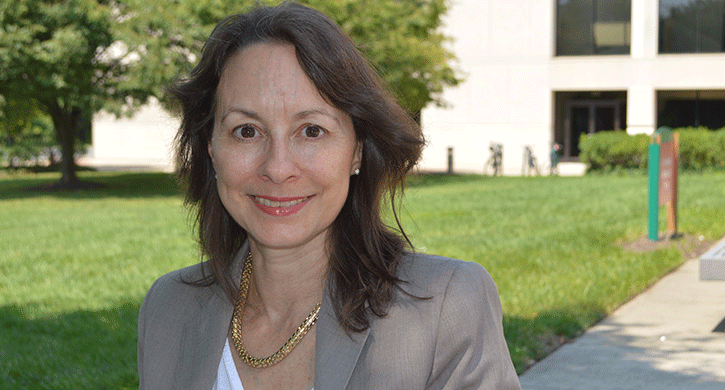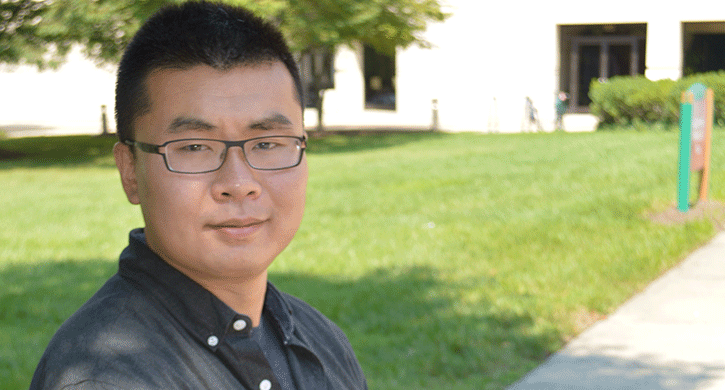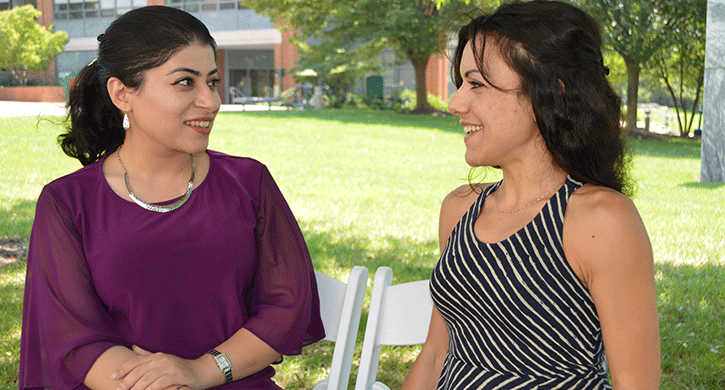.gif)
Bioengineering Department Chair Michael Buschmann warns students against procrastination.
If there is one thing to take away from your courses, it’s how to become a critical thinker. You want to learn how to make a judgment and have the facts to back it up. You want to be able to tell the difference between sound science and flimsy evidence.
Caroline Hoemann
Cracking the code for a successful college career isn’t easy, but there are plenty of practical ways to solve the educational puzzle.
More than two dozen faculty members are joining Mason Engineering this fall, and several of them shared their secrets for academic success. Here are some of their insights:
Keep an open mind. Studying a field intensely will focus your thoughts in that area, but it’s good to be open to different fields and ideas coming from all directions, says Bioengineering Department Chair Michael Buschmann.
The best way to do well in courses is to stay focused in class and develop an organized, time-efficient approach outside of class, he says. “Keep a list of tasks in order of priority and avoid procrastination.”
Take time to absorb the concepts. It’s important to get past memorizing the material into understanding the concepts, says Caroline Hoemann, a professor of bioengineering. The first time you read the material you’re memorizing new concepts. The second time you learn the concepts, and then linking them together helps form the concept maps in your mind, she says.
She advises reading some of the material before class so you can lead discussions and ask challenging questions.
Become a critical thinker. If there is one thing to take away from your courses, it’s how to become a critical thinker, Hoemann says. You want to learn how to make a judgment and have the facts to back it up. “You want to be able to tell the difference between sound science and flimsy evidence.”
Find your personal learning style. When she was in college, Hoemann had several strategies for learning new material. As a visual leaner, she often used differed colored pencils to take lecture notes. “For things I needed to memorize, like the transition metals or the 20 amino acids, I’d use flash cards, create metaphors, or make up silly acronyms.”

Caroline Hoemann, a professor of bioengineering, advises reading some of the material before class so you can lead discussions and ask challenging questions.
Learn by doing. Many engineering subjects require extensive hands-on experience, for example programming/coding, says Yue Cheng, an assistant professor of computer science. “The more you code, the better you know that particular technique.”
Understand the rationale behind what you are learning. Computer science is a practical, application-oriented subject, Cheng says. Knowing why it’s important to study a certain technique, and the rationale behind it, is key, he says. Teachers can help students understand how the technique has been evolving, and why inventors, engineers, and researchers chose to design and optimize it that way, he says.

Yue Cheng, an assistant professor of computer science, suggests studying the rationale behind the techniques you are learning.
Be engaged. Students should feel comfortable asking questions during lectures and afterward, even basic ones, says Emanuela Marasco, an assistant professor in the Department of Information Sciences and Technology. “Questions express students thirst for knowledge. Feedback facilitates communication and improves the effectiveness of both teaching and learning.”
Don’t skip class. That may sound like a no brainer, but it’s important to go to class, especially in the sciences and statistics, says Niloofar Ramezani, an assistant professor in statistics. “It’s harder to catch on later if you miss a lot of lectures.”
When she was in graduate school, she went to class every day, did her homework and studied hard. “I was one of those students sitting in the front row taking notes in 20 different colors, because it helped me stay organized.”
She recommends doing the homework on your own but discuss the course material with other students who may have figured out different ways to learn the material.
Look for real-life applications of your studies. Contact professors, departments, and the community for opportunities in research or data analysis so you can see the application of what you’re studying, Ramezani says. “This will motivate you to learn the methods better.”
While in college and graduate school, Ramezani did several paid and unpaid internships and volunteered to judge research papers for multiple journals and conferences so she could see the application of the theories she was learning in class better. Such activities gave her several research ideas as well.
She says if she could relive her college career, the only thing she would do differently is be more physically active. “Taking breaks for physical activity is beneficial for your brain as well as your body.”

Niloofar Ramezani, an assistant professor in statistics, and Emanuela Marasco, an assistant professor in the Department of Information Sciences and Technology, discuss their best tips for academic success.
